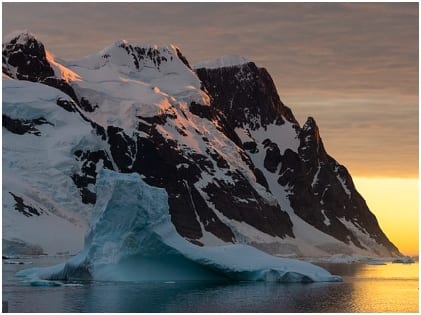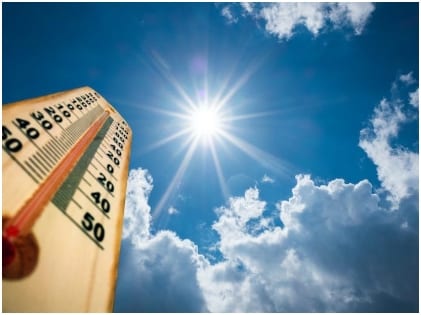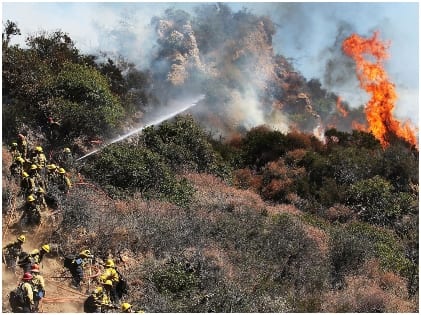2020 is well past its halfway, and if the recent climatic changes are anything to by, this year is easily the hottest ever. Aside from that, 2020 is all set to shatter 2016’s record. If 2020 does so, it will be without the infamous El Nino event that was the prime reason behind the soaring global temperatures in 2016.
The Rising Temperature
 According to experts, if human activities that cause greenhouse gas emissions are not brought to an end, such a situation will arise year after year. If the first seven months are taken into account, 2020 can be easily declared as the second-warmest year ever. According to statistics, it is only 0.7 degrees Fahrenheit behind the temperature that was in 2016 at this point. By certain calculations, 2020 has a 70 percent chance of setting a record of being the hottest year in history.
According to experts, if human activities that cause greenhouse gas emissions are not brought to an end, such a situation will arise year after year. If the first seven months are taken into account, 2020 can be easily declared as the second-warmest year ever. According to statistics, it is only 0.7 degrees Fahrenheit behind the temperature that was in 2016 at this point. By certain calculations, 2020 has a 70 percent chance of setting a record of being the hottest year in history.
Siberia Becomes a Hotspot
 Siberia has certainly been one of the major hotspots in 2020. Since the inception of this year, the region has been hotter beyond what was expected and has contributed towards making January the warmest month on the planet. If you take a look at the recent statistics, the temperature Verkhoyansk was reported to be something around 100.4 degrees Fahrenheit. If you verify the figure by the World Meteorological Organization, this could very well be the first time when the temperatures beyond the Arctic Circle have traveled past 100 degrees Fahrenheit. That’s quite alarming. However, the Siberian hotspot is not the only reason why 2020 is on its way to hold the first position among the list of the earth’s hottest years.
Siberia has certainly been one of the major hotspots in 2020. Since the inception of this year, the region has been hotter beyond what was expected and has contributed towards making January the warmest month on the planet. If you take a look at the recent statistics, the temperature Verkhoyansk was reported to be something around 100.4 degrees Fahrenheit. If you verify the figure by the World Meteorological Organization, this could very well be the first time when the temperatures beyond the Arctic Circle have traveled past 100 degrees Fahrenheit. That’s quite alarming. However, the Siberian hotspot is not the only reason why 2020 is on its way to hold the first position among the list of the earth’s hottest years.
Oceans Are Bearing the Heat Too
 Various other regions across the globe have recorded more than average temperatures. Europe, South America, and Asia have had a record hot first half of 2020. Similarly, the oceans, too, have been quite warm beyond everyone’s expectations. Experts at National Centers for Environmental Information have vouched for the fact.
Various other regions across the globe have recorded more than average temperatures. Europe, South America, and Asia have had a record hot first half of 2020. Similarly, the oceans, too, have been quite warm beyond everyone’s expectations. Experts at National Centers for Environmental Information have vouched for the fact.
Also, you will always come across a hotspot at any corner of the world in any year. Therefore, researchers reveal that the soaring temperature in Siberia is not that unusual. 2019 witnessed several hotspots in the Arctic, especially in the parts encircling Canada, Alaska, and Greenland. A recent analysis has unearthed that situations like Siberia would occur in a gap of 80,000 years owing to the lack of anthropogenic warming. Such extreme temperatures are also affecting larger areas than they actually would, in the absence of a climatic change.
El Niño Event
 One surprising factor is that there hasn’t been a major El Niño event this year. This was the event that took 2016 up the list to become the hottest year ever. El Niño basically can accentuate the global temperatures and can break the record of yesteryears.
One surprising factor is that there hasn’t been a major El Niño event this year. This was the event that took 2016 up the list to become the hottest year ever. El Niño basically can accentuate the global temperatures and can break the record of yesteryears.
However, an El Niño event doesn’t have to happen to help a year take the lead. Both the years 2014 and 2015 turned out to be the then the hottest years without an El Niño occurrence. The 20th century year, 1998, which has a place in the list of NOAA’s top 10 warmest years, experienced an El Niño.
The Changing Baseline Temperature
 Owing to the rise of the baseline temperature of the planet, 1998 is now lagging way behind. Irrespective of how 2020 continues to be, by year-end, it will surely push 1998 out of the top 10 rankings.
Owing to the rise of the baseline temperature of the planet, 1998 is now lagging way behind. Irrespective of how 2020 continues to be, by year-end, it will surely push 1998 out of the top 10 rankings.
Long-term warming is being hailed as the reason why heat records are being set more often in recent years. If you go through the analysis that was published by the Bulletin of the American Meteorological Society in the year 2017, you would know that during the period between the late 19th century and 1980, new records for the warmest year were set every eight to eleven years. Post-1980, new records are being set within a time gap of three to four years.
So, if the running year does make it to the top spot, it wouldn’t be an unexpected incident. Moreover, it will set a bright example of how the temperatures of the planet have changed course. Mankind has to get ready for some drastic and unforeseen situations. If people don’t stop their emission of harmful greenhouse gases, it could aggravate global warming. Otherwise, things will only go from bad to worse and the planet might become unlivable soon. So, make sure you do your bit to preserve the planet!




